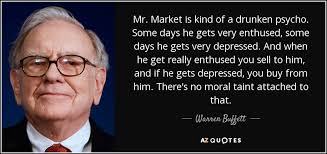Dear Mr. Market:
We wake up to you every day. Once the morning cup of coffee is poured, whether intentional or not, we constantly digest information for the next 16 hours. Most of us check our email, read and/or watch the morning news, glance at social media, and then mix in conversations with other humans that have almost exactly the same patterns. Does this type of routine parlay itself into one that sets you up for making good investing decisions?
NO…most definitely not!
Let’s take for example yesterday, June 8th. To what could have been just another Thursday certainly turned otherwise; yesterday even had it’s own name…”Comey Day”. Millions watched ex-FBI director James Comey testify in front of the Senate Intelligence Committee. There were literally “watch parties” held at bars, restaurants, and even yoga studios all across the country.
Regardless of your political leanings…take off your partisan hat for just a minute and look back 24 hours ago. For those who busted out the popcorn and awaited impeachment news or a massive decline in the stock market, you were once again served a huge Nothing Burger. The media hype did what it’s good at and drove you to tune in. Who really won yesterday? Trump? Comey? Lorretta Lynch? Russia?
Cable TV networks are enjoying banner years. Fox News viewership is 40% higher than a year ago and CNN is enjoying about 60% higher ratings over this same time period. This sad but very real episode of reality television is captivating America and driving people to make some rash decisions.
Fast forward to this morning and one of the first headlines we were treated to was this: “JIM ROGERS: The worst crash in our lifetime is coming”
Feel free to view the article here or read the full transcript via this link.
Should you listen to legendary investment guru Jim Rogers being interviewed by Henry Blodget? Who are each of these brilliant minds with a platform that has your eyes, ears, and full attention?
First and foremost, Henry Blodget is the CEO of Business Insider. Before heading up what is now the fastest growing and largest business news site on the internet, Blodget was a “top ranked Wall Street analyst”. STOP!
For those of you with short memories, Henry Blodget was head of Merrill Lynch’s global internet research team during the dot-com era and was charged with civil securities fraud in 2003. Blodget is now permanently banned from involvement in the securities industry.
Now let’s educate ourselves on who Jim Rogers is. If you don’t look too closely under the hood you’ll just assume he is as portrayed…a sharp bow tie wearing guy who is introduced as a “guru, renowned investor, author, and financial commentator”.
The reality of it all is that guys like Jim Rogers sell fear…and they’re good at it.
He uses a few polished sentences surrounding one or two pieces of economic data or personal observations and then sensationalizes it all to get you scared. It’s not hard to get people thinking about everything that is wrong in the world and when you add a media platform with a 24/7 news cycle, smart guys like Jim are making money off your fear.
Jim Rogers has been wrong for decades. Over the past few years he has been predicting a massive recession. In June of 2011 he said the global economy would be facing another epic recession. We saw him in person later the next year speaking at an investment conference and he said the U.S. is approaching a financial crisis worse than 2008. The next two years he pitched the same headlines and warned his followers of imminent disaster.
Like a broken clock he’ll eventually be right but if you’ve been listening to him or acting on other fear pitches you may be out of money by that time. What’s more amazing to us than wrongly predicting the same thing every year is being offered the opportunity to continue doing so…
Have a great weekend!











